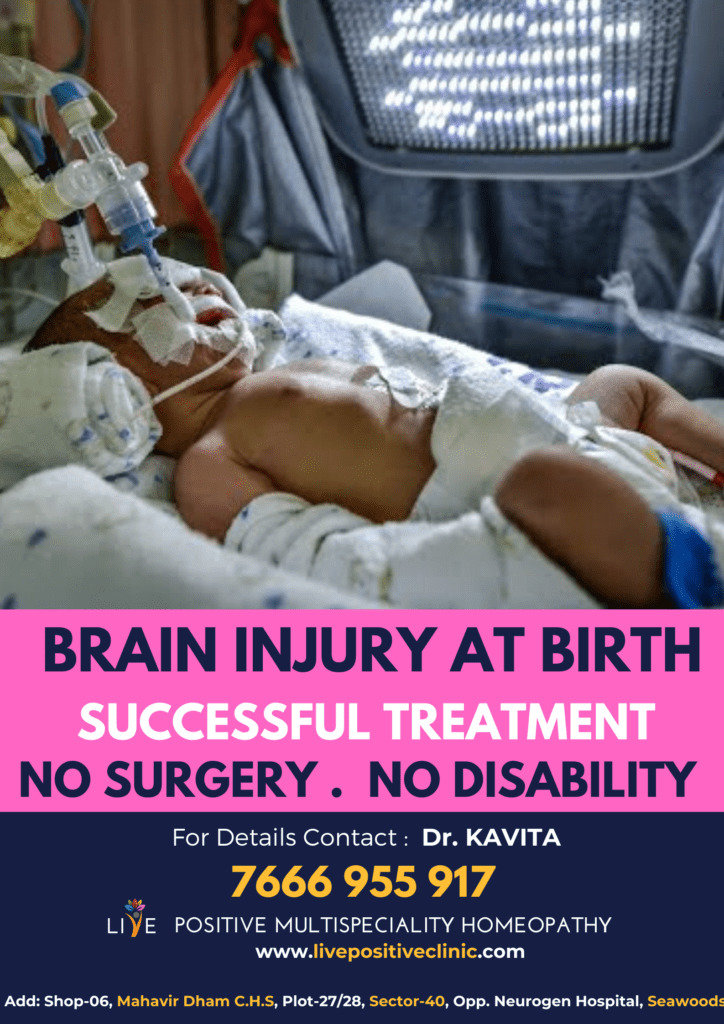Brain Injury from Birth
Brain injury from birth is a serious condition that occurs in newborn babies. This injury can lead to temporary, long-term or permanent neurological and physiological damage.
To have a better idea about brain injury from birth, let’s look at its causes, symptoms, stages and the best treatment option available.
Brain Injury from Birth- Causes
Brain Injury from Lack of Oxygen
Oxygen deprivation (birth asphyxia), occurs in 4 of 1,000 full term births. Premature babies have a higher risk of suffering oxygen deprivation at birth.
There is only a small span of time to treat oxygen deprivation. Even a few minutes of asphyxia at birth can lead to lifelong brain injury.
This brain injury effects later in life in the form of disorders such as cerebral palsy, autism, attention deficit hyperactivity disorder (ADHD), impaired vision.
The lack of oxygen to the baby at birth can be due to various reasons:
- Umbilical cord issues,
- Issues with mom’s blood pressure levels.
- Narrowing of airways,
- Anemia in newborn.
- Premature separation of placenta from the uterus.
- Baby getting trapped in the birth canal during delivery.
According to the Seattle Children’s Hospital, there are two stages of brain injury from lack of oxygen. The brain cell damage in first stage is due to lack of blood flow and oxygen, while the damage in the second stage occurs after the flow of blood and oxygen is restored and is called reperfusion injury.
The brain injury effects of this type of injury may last for periods that range between a few days and several weeks.
Brain Injury from Birth Due to Jaundice
Infant jaundice is a common condition, especially in premature babies. This condition occurs due to excessive amount of bilirubin in the blood.
Infant jaundice must be treated immediately. However, if left untreated, these higher levels of bilirubin result in a condition called kernicterus, a type of brain damage.
Brain Injury from Birth Due to Physical Trauma
University of California, San Francisco (UCSF) School of Medicine says brain injury during birth is the leading cause of cerebral palsy and intellectual disabilities in the United States. Premature babies are at greater risk of suffering brain injuries during the birth process.
Any medical mistakes and other forms of physical harm, during labor and delivery, may lead to infant brain damage. For instance, improper use of birth-assisting tools on the infant’s head like forceps or vacuums, can cause physical trauma to the brain and consequent damage.
Physical trauma can also occur if the delivery progresses too quickly and rapidly. Situations of a difficult delivery are when the baby’s head constantly hits against the mother’s pelvic bone, and if the attending doctor does excessive twisting and pulling during a difficult labor.
Infections in the Mother
It is advisable that physicians monitor and detect maternal infections as soon as possible during pregnancy. Infections such as rubella, herpes, varicella, and syphilis may result into neonatal brain damage, if left untreated.
Other types of maternal infections also include:
- Cysts
- Vaginal yeast infections
- Diarrhea
- Pyelonephritis
- Venereal warts
- Coughs lasting more than a week
A Danish clinical study state that babies born to women with maternal infections are at a higher risk of developing disorders like childhood epilepsy, cognitive issues, and schizophrenia.
Infections in the mother may also lead to premature birth, which in turn shoots up the risk of infant brain damage and cerebral palsy.
Premature babies born with low birth weights have heightened risk of developing brain damage and several other disabilities and physical limitations.
Symptoms of Brain Injury from Birth
The severity and types of symptoms vary according to cause of brain damage. Some symptoms develop slowly, whereas others are immediately visible.
Abnormal Temperament
Although it is normal that infants cry after birth, excessive crying and high-pitched wails, refusal of nourishment and being extremely fussy may be a sign of brain damage.
Physical Appearance
Although there are cases in which an infant with brain damage looks physically normal, in many instances an abnormal physical appearance is a sign of brain damage.
For example, infants with brain damage may:
- Have an unusually small skull,
- Find it difficult to focus their eyes,
- Have deformed facial features,
- Have a deformed spinal cord and,
- Have an abnormally large forehead.
Developmental Delay
Brain damage can cause developmental delays. Many a times, it is the developmental delays that raise suspicion of damage to the infant’s brain. Milestones like neck holding, turning over, sitting, crawling, walking, talking etc. are quite delayed or do not occur at appropriate age.
However, it’s important to note that not all babies do hit developmental milestones at the same time. A physician will be better able ascertain if your infant’s developmental delays are a matter of concern or not.

Life-saving Treatment for Brain Injury from Birth
Brain injury can be fatal or cause life-long disability and impairment of normal functioning. We have developed a brain injury treatment that can affect the outcome of brain damage in a very positive and favorable manner.
Our Live Positive brain injury treatment protocol has saved many lives and helped hundreds of patients lead a disability-free life.
Remember, the decisions that you take as a parent can be huge for your baby. Conventional medicine has already proved that it cannot be of any great help in treating brain injury and does little to modify the outcome of the injury.
Your child will have to bear the brunt of inadequate treatment. Imagine how glad you would be, if you could help your child get the right treatment for brain injury. He/ she will be able to lead a normal and fruitful life.
Our Live Positive protocol is the safest, most effective and successful treatment for brain injury from birth.
